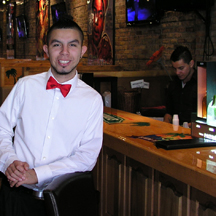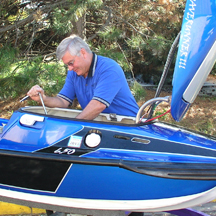Focus on the Student Experience: Global Entrepreneurs
Fall 2011
Global Entrepreneurs
Roberto Hernandez is a recent graduate of the Bridge to Entrepreneurship & Business program, a class that introduces English Language Learner (ELL) students to the opportunities and challenges of owning a business. Coming from a family of entrepreneurs, Hernandez began preparing for the program when he was quite young. “I moved here with my family from Mexico when I was 11,” states the 19-year-old student. “In 2003, my older brother opened a restaurant where I now work full-time as assistant manager.”
 |
| Roberto Hernandez |
His older sister, Mariana, just opened a new fast-food restaurant with their brother and mother. “She was the one who first told me about the program,” Hernandez says. “What my sister learned from the class, she used to plan her restaurant.”
For many immigrants, owning a business is part of the American dream. “We felt there was a real need for this program, and Roberto and his family are perfect examples,” notes instructor Caethe Brockman. “A recent study showed that in 2010 the immigrant rate of entrepreneurial activity in the United States was 62%. That’s much higher than the native-born rate of 28%. The main goal of this class is to help students see if they have a solid new business idea.”
“Roberto had big dreams of starting a nightclub,” adds Mark Labinski, Brockman’s co-instructor who specializes in teaching English as a second language. “In the beginning, he seemed very focused on that goal, but he soon realized from experiencing certain aspects of the class that this idea wasn’t feasible yet.”
Hernandez changed his perspective. “I realized through the class that I was in too much of a hurry,” he says. “I need to learn more things about business before I step out on my own.” He will be a full-time student at FVTC this fall. “I still have a lot of ambitions, but I want to take my time and find out the best direction to follow.”
The first-year class emerged as a model for ELL entrepreneurship in the Wisconsin Technical College System. Inaugural class students, along with Brockman and Labinski, presented their learning experiences to members of the other 15 technical colleges during a statewide WTCS board meeting last year. That same class also created a business plan to sell water bottles with the proceeds going to KIVA, an online micro-lending institution that helps startup businesses worldwide. Proceeds from these businesses are used to alleviate poverty in third-world nations.
This year’s class is considering another product-based project, with proceeds going again to KIVA. Current students are from Kenya, Egypt, Haiti, Brazil, China, Taiwan, Pakistan, Tajikistan, and Nicaragua.
Lifelong Learning Starts at Any Age
At 64 years young, Bob Slavik turned a layoff into a new career. For many mid- to late-career workers, losing a job can be debilitating. Slavik, however, looked at his challenging situation differently.
 |
| Bob Slavik |
When this 64-year-old machinist was laid off, he saw it as an opportunity to explore a new career. So he enrolled in Fox Valley Technical College’s Outdoor Power Equipment Technician program. After earning a technical diploma from that program, he enrolled in the Power Sports Technology certificate program, designed for individuals who want to learn how to repair ATVs, snowmobiles, motorcycles, and marine and personal watercraft.
“I’ve always maintained my own vehicles,” Slavik says. “I just decided it was time to learn how to do it the right way and maybe help others too.”
Returning to school after so many years took a little getting used to, he admits. “I have to confess,” Slavik laughs. “My wife helped me write my first paper using the computer. Getting used to the computer was the hardest part for me! I definitely liked the lab settings the best because you could tear something apart and then fix it.”
Slavik quickly adapted to the classroom setting. “As a former machinist, Bob was very organized,” says Jerry Fischer, Slavik’s Outdoor Power Equipment instructor.
Slavik was soon up-to-speed and his superior fix-it capabilities came through loud and clear in state and national competitions. He took home first place in marine service technology at the state level and placed third in a national competition in Kansas City. Both events were part of the annual SkillsUSA competitions to recognize outstanding students across the nation who possess exceptional advanced technical skills.
After completing the program in December, Slavik plans to continue to work as an independent mechanic. “Word has spread and business is pretty good,” he says. There’s always somebody who needs something fixed. All my life I have worked for someone, and now I am my own boss. I owe that success to my instructors.”
Slavik also predicts that he’ll soon be back on campus after he’s finished the program. “We have this rocking chair that my wife likes,” he says. ”I’ve refinished it, and now I want to learn how to reupholster it!”